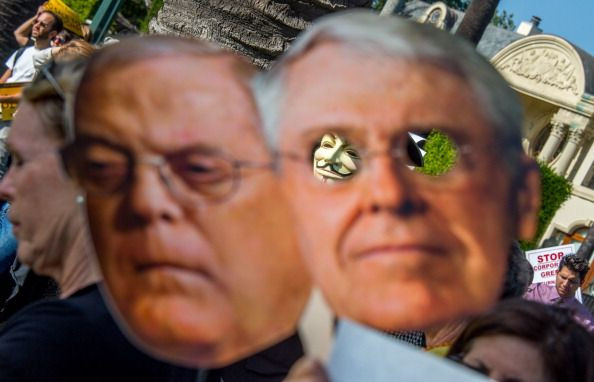A Brokered GOP Convention Could Mean A Second Chance For Koch Brothers, Other Frustrated Donors

Now that John Kasich has denied businessman Donald Trump a victory in Ohio, it looks possible that no Republican presidential candidate will have won a delegate majority by the time the last state primaries take place in June. That means the party could be headed toward a brokered convention, and another opportunity for the GOP's beleaguered mega-donor network to anoint one of its favored candidates.
The front-runner in the 2016 Republican primary may be a billionaire, but big money has otherwise made a poor showing in the GOP race so far. Billionaire conservative activists Charles and David Koch favored Wisconsin Gov. Scott Walker, but he dropped out of the race early, followed by establishment favorites Jeb Bush and Marco Rubio. Now the leader of the pack is Trump, a divisive candidate who has thus far eschewed both super PAC assistance and libertarian economic orthodoxy.
To secure the nomination and avoid a contested convention, Trump needs a total of 1,237 delegates. He currently holds 661 delegates and 1,079 remain available, which means he must pick up approximately 55 percent of the delegates in upcoming primaries. That's not impossible. But among the delegates from states that have already voted, Trump has yet to crack 50 percent.
In the event of a brokered convention, the nomination could go to Trump or one of the other remaining candidates — or it could go to someone who isn't even in the race right now. On Tuesday, House Speaker Paul Ryan declined to rule out accepting the nomination. A spokesperson later ruled it out on his behalf, but not before his predecessor, John Boehner, suggested that Ryan would be a good choice in the event of a deadlocked convention.
Ryan ascended to the speakership in October largely because he was a palatable choice for multiple wings of the fractured GOP, with friends in both the establishment camp and the Tea Party. But one specific group appears to be particularly fond of him: the Koch network.
In her book "Dark Money," an exposé on the billionaire conservative donors the Koch brothers and their campaign infrastructure, journalist Jane Mayer reports that a Koch lieutenant spent months attempting to nudge Ryan into the 2012 Republican presidential contest.
"The billionaire backers were eager for him to apply his 'sharp knives' to the federal budget," wrote Mayer. "But Ryan had demurred. Neither he nor his wife relished a presidential marathon."
If a brokered convention were to take place and Ryan stayed out of the running, conservative mega-donors could still have a voice in selecting the nominee. But without any precedent for a deadlocked convention in the super PAC era, it's difficult to predict.
"We haven't necessarily had this kind of scenario in a long time, where people have had these sort of abilities," Nick Kachiroubas, a professor at DePaul University's School of Public Service, told International Business Times.
In past brokered conventions, machine politics and patronage usually helped seal the deal. As outside donor networks and political organizations have gained power relative to the old-fashioned party machines, their influence could add force to candidates' promises of political support in exchange for delegate votes.
"They could say, 'If you deliver so many votes for this person or that person, we can make available these resources to help you take over the State House,'" said Kachiroubas. "That becomes very helpful in this kind of chaotic system that we currently have."
Trump is still the likeliest nominee, but decisively locking down the nomination could mean cutting some backroom deals to win over delegates. At the very least, the threat of a brokered convention may put his apparent détente with the Koch brothers to the test.
© Copyright IBTimes 2024. All rights reserved.






















